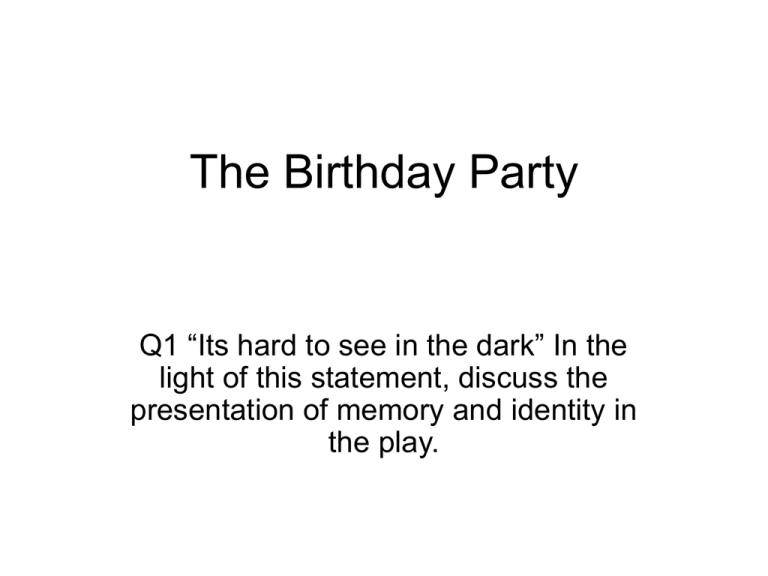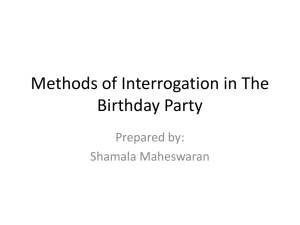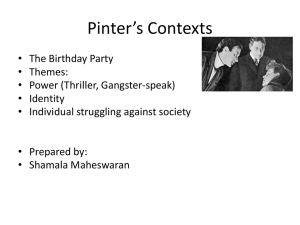BP 2T03 Question 1
advertisement

The Birthday Party Q1 “Its hard to see in the dark” In the light of this statement, discuss the presentation of memory and identity in the play. Role of light • Light as a representation of hope, purity, cleansing and ironically, re-birth (in the case of Stanley) • “(Mccann goes to the door, switches off the light, comes back, shines the torch on Meg. Outside the window there is still a faint light)…(Mccann shines the torch in Stanley’s face)”-Act 2 Page 54 • Role of the light from OUTSIDE the window suggests that with the presence of light still there, Goldberg and Mccann cannot truly change Stanley. Cross-reference to page 63, it’s only when there is absolutely ‘no light AT ALL through the window’ does Stanley change. • The outside light further symbolizes Stanley’s life force or willpower in retaining his identity. Role of light • • • • ‘Mccann switches out the lights, comes back, and shines the torch in Stanley’s face. The light outside the window is FAINTER.’ Act2 P57 The true birthday party only happens when the lights go off, suggesting that Goldberg’s and Mccann’s reconstruction of Stanley can only start when the lights, a symbol of hope, purity and safety, go off. The role of the outside light getting fainter may symbolise Stanley’s waning willpower in resisting Mccann and Goldberg and retaining his identity. It’s their reconstruction of Stanley as his own birthday party is not in his power and that the ‘celebratory event’ is, ironically, conjured up by Meg, his own mother figure. Furthermore, this is reinforced through the breaking of the drum and Stanley’s glasses on page 63. The drum and glasses are symbols of Stanley’s identity, and when Stanley gets a new pair of glasses from Mccann in act 3, it symbolizes the new identity that has been thrust upon Stanley in Goldberg’s and Mccann’s act to get him ‘accepted’. Role of light • • • • • • • ‘Blackout’ ‘There is now no light at all through the window’ – Act 2 page 63 Effect : To leave the audience in a state of disarray and confusion with the remainder of the scene deliberately left ambiguous so as to provoke thought from the audience and for them to make their own interpretations and conclusions. “Where is he? Let go of me! Who’s this? Someone’s touching me! Where is he?” Enumeration of questions and exclamations further enhances the dread and confusion the audience is experiencing and climaxes in Stanley’s attempted rape of Lulu in which the audience is left shocked. Stanley’s complete loss of identity at the end of the scene can only be completed by the removal of light from the scene. What is suggested is that Stanley has attempted to rape Lulu, with the repetition of the word ‘giggling’ adding to the suggested insanity that climaxes in Stanley. Role of light in starting and ending the official ‘birthday party’ and denoting the full transformation of Stanley away from his original identity. Furthermore, role of the blindfold in artificially removing light from Stanley’s eyes begin his change of identity as he starts to strangle Meg. Topic Sentence: Identity is presented as unable to be fully constructed as characters like McCann shapes his identity around his memory. • McCann’s identity is never fully uncovered in the play • McCann seems to desperately cling to his memories of the past to his present perceptions. Evidence • [Act I page 29] “ This job - no, listen – this job, is it going to be like anything we’ve ever done before? “ • [Act II page 37] “ My name’s McCann.” “ Many happy returns of the day. Were you going out?” Analysis • McCann constantly refers to the past to derive directions for the present. “ No, just tell me that. Just that, and I won’t ask any more.” His persistence is seen in this conversation with Goldberg, showing how he desperately clings on to memory for security. • In his conversation when he first meets Stanley, both hide their identities behind causal, meaningless banter. Nothing is revealed about themselves between them, just the exchange of formalities. Effect on audience • The dramatic dialogue reveals to the audience how characters construct their lives around their memories and not based on reality. It also shows how characters are perhaps so reliant on memory that they are unable to live or achieve anything in its absence . • Through the dramatic dialogue between McCann and Stanley, Pinter projects how language and the formalities expected by society in conversation hinders individuals from constructing and revealing their true identities. Topic sentence: In the play The Birthday Party the character Meg’s identity is often in question as she has misshapen identities of both herself and Stanley • Meg sees Stanley as a foster child despite his apparent maturity. • Throughout the play Meg’s identity jumps from landlady, mother figure and sometimes suitor to stanley. • Her own memory is questionable as her recounting of Stanley’s occupation to Goldberg and McCann proves unreliable. Examples • [Act 1 page 32] “Meg (falteringly). In… A big hall. His father gave him champagne. … and then he got a fast train and he came down here. • [Act 1 page 18] “Stanley. And it isn’t your place to come into a man’s bedroom and-wake him up. • [Act 1 page 18] “Meg (sensual, stroking his arm). Oh, Stan that’s such a lovely room… in that room. • [ Act 2 page 55] “Meg. … and he’s MY Stanley now. Analysis • [Act 1 page 32] “Meg (falteringly). In… A big hall. His father gave him champagne. … and then he got a fast train and he came down here. – Meg’s memory is shown to be faltering as her recount of Stanley’s days as a pianist is shown to be out of sync with what Stanley had told her just a few lines ago. – Memory creates identity, Meg’s fluctuating memory links to her fluctuating identity throughout the play. – (falteringly) Meg’s creation of a false memory implies that her identity too could be a fabrication due to the circumstances of her and Stanley. Analysis • [Act 1 page 18] “Stanley. And it isn’t your place to come into a man’s bedroom and-wake him up. • [Act 1 page 18] “Meg (sensual, stroking his arm). Oh, Stan that’s such a lovely room… in that room. – Meg’s identity as Stanley’s landlady often crosses the boundaries of 2 adults as Meg attempts to play the role of his foster mother and also his suitor. – Meg’s invasion of Stanley’s privacy and personal space can be seen as her attempt to infantilise him, her misshapen identity and what she projects onto Stanley can be seen as her being stuck “in the dark” Analysis • [ Act 2 page 55] “Meg. … and he’s MY Stanley now. – Pinter uses the personal pronoun MY, to denote Meg’s ownership of Stanley – Meg identifying Stanley as a piece of property is ironic as Goldberg and McCann had belittled Stanley to the point of him being objectified Effects on Audience • Meg’s effect on the audience mixes the question of identity and memory. • She acts as a questionable mother figure to Stanley, making the audience question the family as a unit through her in competency Topic Sentence: In the birthday party, Stanley’s own identity is constantly in flux, due to his need to reshape his own identity to protect himself, and this is shown through Pinter’s use of dramatic language. • • • • For Stanley ,Identity is based on memories that are constantly reshaped to suit the situation. Stanley seeks to escape the threat that he knows is coming, namely the state who is coming to crack down whilst impressing Meg. Due to this, he reshapes his own image in order that he can portray himself as the citizen that society wishes for him to be. The constant reconstruction of his identity even leaves him questioning himself at times, which only increases the confusion that the audience feels. Stanley( Cont’d) • Example 1 : – Page 22: “ I’ve played the piano all over the world. All over the country” • Example 2: – Page 23: “My father…that was it” • Example 3: – Page 42: “ I know Ireland very well”, “I’ve been there. I’ve never seen such sunsets” Analysis of evidence • Page 22: – The change in the magnitude of exposure that Stanley has experienced shows us how he’s trying to deliberately make his story more believable, almost as though he is constantly in a battle to explain that what he is saying is the truth. – The creation of this piano playing genius,as opposed to Lulu’s claim that “You’re a bit of a washout, aren’t you?” is designed in a two fold manner • Placate the state officials • Make himself look better in the eyes of Meg – Creates a whole new identity that clashes with what Goldberg and McCann state later – The use of declaratives in the words “I’ve” also serve as an additional buffer from rebuke or challenge as it forces us to believe Stanley – It further highlights the futility of memory and identity as fixed entities that can be relied on, as seen through Goldberg as well. Analysis (Cont’d) • Page 23: – The breakdown of memory in the description of the father is 2 fold as well • It shows us how Stanley was relying on a flawed memory in order to reshape his own identity and more importantly, he had created a situation in which he had a potential loophole • The repetition of the “I-I” shows us his own uncertainty in the shaping of his memory, highlighting the weaknesses on relying on memory to shape one’s identity. • The loophole of the father is thus plugged, allowing Meg and the casual audience member to ignore the obvious change in story, showing how his memory was unreliable and thus, his identity was self contrived and could not be entirely accepted. Analysis (Cont’d) • Page 42 – The reference to Ireland is one that is aimed at placating and winning over McCann. – Stanley tries to make McCann feel like he’s not an outsider or someone the state should be worried about. – The reference to Ireland comes directly after the statement “ Where do you think?” by McCann • This gives Stanley the opportunity to gain some ground with McCann even though it is obvious that he’s never been to Ireland • The general nature of the description of Ireland that he gives us serves to show us that he has only a typical knowledge of Ireland, associating it with “sunsets” and “Guinness” which do not give us any additional knowledge of the area • The use of language here carries almost a tone of appeal as opposed to the past when he used his language to reshape his identity to impress. – “What about coming out to have a drink with me?” » Carries the connotation of wanting to create a friendly atmosphere so as to protect himself from the threat of the state. Effects on the Audience • The audience becomes aware of the inherent flaws and weaknesses that memory and identity have and thus, places a heightened degree of mistrust on them. • Furthermore, we see how language can be used to transform the way one presents themselves, primarily to rebuild how we appear to others. • We see that identity in the play becomes a fluid entity that one uses to defend oneself from other external threats that one has to deal with • We also see how Stanley and Goldberg become main promoters of this ideology as they individually have the most to hide. Synthesis • As such, we see that through the constant fluctuating manner that language is employed to reshape memory and identity, they become important tools in the formation of one’s individual character. Conclusion • As such, we can see that Pinter uses language as a key device to showcase the role of memory and identity as flawed entities for us to base our realities on.






